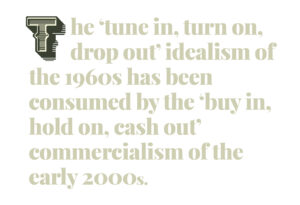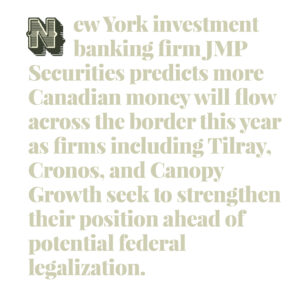Mergers and acquisitions are a lot like royal marriages: They’re founded not on affinity but on long-term mutual benefit, and a successful coupling in either one might generate wealth, forge alliances, capture land, or protect from enemies. Against the odds, it looks like the cannabis industry is doing better than Buckingham Palace.
Deals in 2021 more than tripled 2020’s number, according to Viridian Capital Advisors, vaulting from eighty-six to 306. Of those, 209 involved American companies for a total of $10.1 billion. Viridian, which tracks mergers and acquisitions as well as investment in the industry, expects the action will be even hotter in 2022. New York investment banking firm JMP Securities predicts more Canadian money will flow across the border this year as firms including Tilray, Cronos, and Canopy Growth — all of which sank money into the United States in 2021 — seek to strengthen their position ahead of potential federal legalization.
Big Pharma also is beginning to reveal its intentions to participate in the industry, however furtively. In March 2022, Pfizer Inc. acquired Arena Pharmaceuticals, which is developing cannabinoid-based medications to treat Crohn’s disease and irritable bowel syndrome, for $6.7 billion. (Pfizer announced the deal in a press release that never mentioned cannabinoids.)
During the same month, observers and investors also were rocked by Cresco Labs’ acquisition of Columbia Care, a $2-billion jaw-dropper that created one of the largest cannabis operators in the United States by market valuation. Columbia Care’s 130 recreational and medical dispensaries have passed through the usually complicated process to obtain permits and licenses, giving Cresco Labs an immediate footprint in seventeen states.
If advocates and foes agree on one thing, it’s that cannabis has acquired critical mass. Despite federal prohibition, sales soared 71 percent to $25 billion in 2021. Investment, however, sunk by two-thirds to around $2 billion. Capital investment appears to have recovered from the slump, and observers expect the situation to remain stable, at least in the near term. Recent shakeouts and streamlined business plans have settled the sector for more cautious investors.
Inside the cannasphere, there’s a trace of relief and a wisp of optimism. Medical sales are permitted in thirty-eight states plus the District of Columbia; eighteen of those also permit recreational adult use, and more states are expected to legalize the plant in the midterm elections. In addition, more than two-thirds of Americans believe cannabis should be legal, which explains why Amazon sells every imaginable accessory to help people smoke their stash.

No one is forgetting how many states botched the rollout or continue to starve enterprises with onerous taxes and limited licenses. They are not overlooking the fact that touching the plant is still illegal under federal law. Nevertheless, many professionals are feeling bullish.
“In 2018, it was still a paper industry, great pitch books, all intention,” said Jonathan Decourcey, equity research analyst for Viridian Capital Advisors. “Now we are in execution time, and the fundamentals of the market are improving. About a half-dozen businesses are worth a billion now. When you look at the 2022 numbers, you’ll see this is a viable industry.”
Matias Pino, chief financial officer at craft cultivator Posibl, said he and his partners plowed investors’ $40 million into start-up costs such as property and infrastructure buildout. The company cultivates, processes, and distributes fully packaged business-to-business cannabis products. Its first foray into a consumer brand is Humo, which is marketed to Latinx smokers.
Experienced cannabis investors are increasingly confident in the sector despite it being so unpredictable that even experts can be taken by surprise. For instance, who would have guessed a global pandemic would be so good for cannabis sales?
In early 2020, no one expected a pandemic to all but shut down the global economy and trigger nearly record-level unemployment. And at first, few predicted a lethal respiratory virus would be good for a product that is most often smoked. But surplus free time and chronic anxiety — not to mention government stimulus checks — spurred sales, even in states where the plant is still illegal. When most legal states categorized cannabis sales as an essential service on par with gas stations and grocery stores, the plant gained legitimacy with new customers and investors alike.
Even weed-averse states are starting to take a second look as COVID continues to strain healthcare systems and social benefits, making new revenue irresistible. Expect eight states to come aboard as a result of the November elections.
A fish-eat-fish industry
What’s behind the mergers and acquisitions? In a word, warp-speed growth. Seal the deal! Buy the subsidiary! Hire a celebrity! Cash out!
Much of the cannasphere is dreading the influx of multistate operators, Big Alcohol, and Big Pharma, which have the resources to swallow the sector by squeezing out or buying up existing businesses. Despite their head start, mom-and-pop shops are especially vulnerable, as are small minority-owned enterprises in the production and retail sectors. Many fear the big fish, with their access to capital and years of strategizing, will simply push the “on” button when lawmakers finally overturn federal prohibition.
That said, funding and support for small businesses have not dried up. Federally chartered banks cannot make loans to plant-touching businesses, but there’s more capital available than ever before. Investors — exchange-traded funds, hedge funds, special purpose acquisition companies, and individuals — already are breaking in and cashing out, and plenty of market segments still see “green” as both product and profit.
Optimists see in the zeitgeist a potential windfall for entrepreneurs, investors, and customers. Those who harbor a darker view foresee consolidation, unemployment, and foreclosures.
There is no disputing the upside can be dramatic for companies that attract interest. Investors bring cash and experienced financial and management teams, but they have a lot to gain from those with industry knowledge. The hungriest fish can most quickly catch their meals by acquiring smaller companies that will expand their geographical footprint or advance specialized research and development.

“We are working at the intersection of two start-up industries — the evolving cannabis industry and Silicon Valley,” Jennemann said, adding the company will focus on consumers, not bulk sales.
In such a decentralized, fragmented market, any company can have a lot to offer. The cannasphere’s most established entities have useful connections, hard-to-get licenses, and ambitious expansion opportunities. Medium-sized companies might develop new technologies and growth based on economies of scale. The most desirable small businesses might offer more prestige than return on investment, depending on their small-batch strains or unique retail persona.
How can companies climb the food chain before lunch is served? By doubling down on core business and streamlining operations, according to people in many sectors of the industry. Investors are looking for targets that are underperforming or already in peak shape. In the world of mergers and acquisitions, even improbable alliances can create synergy — but only if investors are willing to give them time and professional support.
Although much of that business is speculative, it has stabilized the market. Many of the earliest investors expected cannabis to be a gold mine with rapid growth and swift returns. But even pro-weed states dealt with the turmoil of legalization, and few business models reflected the chaos that still roils some states nearly two decades later. Disenchanted short-termers bailed out.
The market was littered with companies that flamed out after initial success, but no failure was more spectacular than MedMen’s. The company’s story began in 2017 with a pair of twenty-something guppies who stepped into the right place at exactly the right time. Andrew Modlin and Adam Bierman reconceptualized the retail experience, and private investors flung them the cash to see it through.
MedMen quickly bloomed from operating one California store to become one of the earliest multistate operators. The company’s twenty-nine adult-use and medical dispensaries looked more like Apple stores than doctors’ offices, a revolutionary design in a retail landscape populated by tie-dyed budtenders and salespeople in white lab coats.
MedMen was one of the first companies to establish a brand in a fractured market, and it debuted in May 2018 on the Canadian Securities Exchange with a valuation of $1.6 billion.
But Bierman and Modlin ran off the rails, cutting corners and living large. MedMen soon was hit with a barrage of lawsuits alleging the two founders manipulated stock prices, committed bank fraud, violated labor laws, and bribed a politician. The most spectacular allegations included charging to the company personal expenses including lavish parties, custom Cadillac Escalades, and elaborate personal security measures. The stock tumbled from a high of $7.57 per share in October 2018 to 14 cents on March 30, 2022. By then, MedMen’s valuation had plummeted to $220.9 million.

Canadian powerhouse Tilray Brands Inc. netted the sickly fish in August 2021, acquiring a potential 75-percent stake in the company for $166 million. The upside is enormous: When cannabis is legalized, Tilray will have a multistate footprint in the American market.
Free the plant
Nearly every major decision throughout the cannasphere depends on abolishing federal prohibition. No one doubts this will happen, but no one knows how long the feat will take. Until then, plant-touching enterprises cannot cross state lines or acquire funding from traditional sources.
Some of the biggest names in the business are lobbying for legalization, from Seth Rogen and Snoop Dogg to Amazon and Altria. Their passion and money may sway voters and shareholders, but it isn’t likely to do much in Washington. Congress has signaled it is increasingly receptive to legalizing marijuana in some form, but the issue remains stillborn in the Senate.

The cannabis community is of two minds on legalization: Lifting the ban will make it easier for businesses to grow by taking advantage of tax breaks, capital markets, and banking services routinely available to other industries. However, it also will unleash competition from MSOs, big-money institutional investors and, of course, Big Tobacco, Big Alcohol, and Big Pharma.
Don’t expect much momentum before the November 2022 election as lawmakers focus on Russia’s war in Ukraine and the economy, not to mention vicious partisan attacks that ensure legislative gridlock. Cannabis legalization isn’t likely to be much of a campaign issue as voters express deep concern about inflation, education, healthcare, and political unrest.
The Nixon administration kicked off the war on drugs in 1970 by classifying cannabis among addictive and hallucinogenic drugs too dangerous to have social or medicinal value. This effectively and transparently targeted Black and Brown men, as well as activists opposed to the Vietnam war — groups with whom marijuana was popular. The Controlled Substances Act (CSA) has survived fifty years of legal challenges, including before the Supreme Court. The high court upheld parts of the law as recently as 2005, diminishing hopes for judicial intervention.
Until Congress removes cannabis from the CSA or scraps the law entirely, marijuana remains federally illegal. States have passed their own laws permitting its sale, manufacturing, consumption, and research, but these do not nullify federal constraints.
Products laced with THC are available nationally in Canada, which legalized cannabis in 2018. Not only has this given Canadian companies a head start, but it’s also given them access to international markets. For companies such as Tilray, it is advantageous to buy a U.S. company before big banks and funds can get to it.
The legal limbo also has created a rare opportunity for retail investors. Major banks and institutional funds are leery of the industry’s uncertain status, leaving plenty of room for individuals to make relatively small investments without the constant pressure of quarterly earnings reports.
Anecdotally, at least, people are taking advantage of this lacuna. So are the name brands attempting to squeeze into the cannasphere before the door swings wide. The “tune in, turn on, drop out” idealism of the 1960s has been consumed by the “buy in, hold on, cash out” commercialism of the early 2000s.
“We are in the third inning of nine,” said Posibl’s Pino. “The first was the gold rush; the second was the MedMen era. Now we’re in the wave of fat-capital investing in the biggest greenhouses. Everyone wants the biggest greenhouse.”












[…] success. Whether you are entering the realm of finance, operations, marketing, manufacturing, or investing in a licensed grow, formal training specific to cannabis plants and the industry is a […]
[…] His first major success as a business owner came with Arbor Pharmaceuticals, then a small drug company doing $1.5 million in annual sales. Wild and a partner acquired the company for $2.5 million and invested another $3 million in operating capital. Within three years, Arbor was producing $100 million per year in pre-tax profit. In 2015, Wild and his partner sold a third of the company to private-equity firm KKR & Co. at a $1.12-billion valuation. The proceeds from the deal composed the initial capital JW Asset Management invested in the emerging Canadian cannabis market. Wild put money into licensed producers including Canopy Growth and Cronos. The bets delivered impressive returns when tobacco giants Altria and Constellation also bought into the industry. […]
[…] in most other emerging industries, cannabis businesses need insurance to attract investors, who provide the financing that enables companies to grow. Also like in most other nascent […]